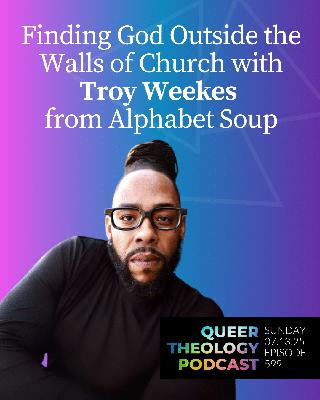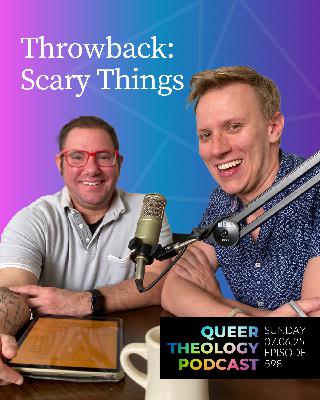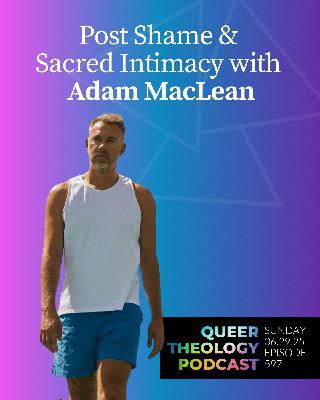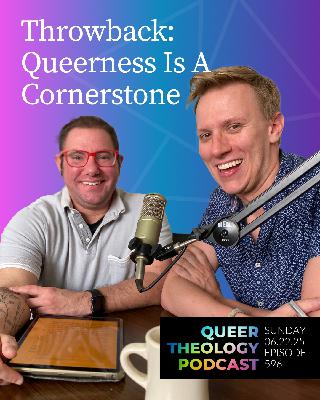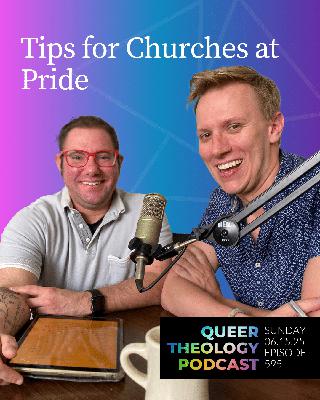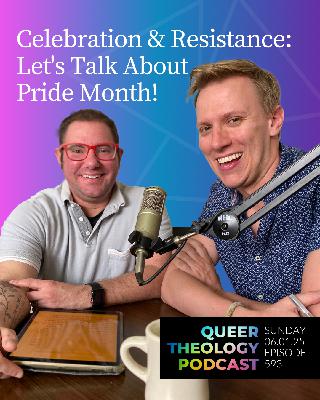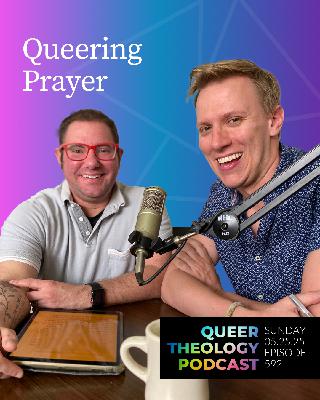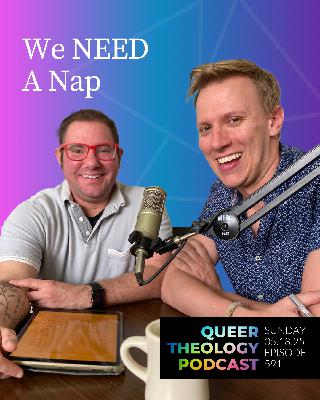The Journey of a Queer Disabled Advocate with Andrew Gurza
Description
Andrew Gurza (@andrewgurza) joins Brian this week on the podcast to talk about sex, disability, and his new book, “Notes From a Queer Cripple.” Andrew is an award winning Disability Awareness Consultant and the Chief Disability Officer and Co-founder of Bump’n, a sex toy company for and by disabled people. Andrew uses they/he pronouns and identifies proudly as disabled. He is also the host of Disability After Dark: The Podcast Shining a Bright Light on Disability Stories. In this conversation, Andrew shares their journey as a queer disabled person, discussing their experiences with sexuality, disability advocacy, and the importance of creating inclusive spaces. They delve into their work as a speaker and author, emphasizing the need for open discussions about sex and disability. The conversation highlights the challenges faced in the community, the impact of critiques, and the joy of connecting with others through shared experiences.
Takeaways
- Andrew has been a disability consultant for 14 years.
- They emphasize the importance of discussing sex and disability openly.
- Andrew’s book is a love letter to queer disabled people.
- They advocate for the inclusion of disabled sexuality in mainstream conversations.
- Andrew’s experiences with sex work have transformed their relationship with intimacy.
- They believe that disabled people deserve to explore their sexuality freely.
- Andrew’s journey includes creating a sex-positive community for disabled individuals.
- They highlight the need for more accessible spaces for disabled people to express their sexuality.
- Andrew’s work aims to challenge societal norms around disability and sexuality.
- They encourage others to see the beauty in their bodies and desires.
Chapters
(02:40 ) Talking About Sex and Disability
(05:37 ) The Journey to Disability Advocacy
(08:29 ) The Book: Notes from a Queer Cripple
(11:19 ) Sex Work and Intimacy
(14:09 ) The Importance of Connection
(17:01 ) Embracing Sexuality and Body Positivity
(19:50 ) The Power of Humor in Disability Advocacy
(22:52 ) The Influence of Queer Media
(25:10 ) Creating Inclusive Spaces for Disabled Queer People
(28:32 ) The Impact of the Deliciously Disabled Party
(31:07 ) Navigating Critiques and Misunderstandings
(34:35 ) The Complexity of Disability and Sexuality
(37:21 ) The Importance of Community and Support
(40:19 ) Final Thoughts on Sexuality and Disability
Resources:.
- Notes From a Queer Cripple by Andrew Gurza
- Learn more about Andrew Gurza https://www.andrewgurza.com/about
- Join our online community at Sanctuary Collective Community
This transcript was generated by AI and may contain errors or omissions.
(9s):
Welcome to the Queer Theology Podcast. I’m Brian G Murphy. And I’m father Shannon, T l Kearns. We’re the co-founders of Queer Theology dot com and your hosts from Genesis, revelation. The Bible declares good news to LGBTQ plus people, and we want to show you how Tuning each week on Sunday for conversations about Christianity, queerness and transness, and how they can enrich one another. We’re glad you’re here. Hello. Hello. Hello and welcome back to another episode of the Queer Theology Podcast. Today we’ve got a really exciting interview with Andrew Gza. Have been a fan and follower of Andrew Online. I think I first saw him through the website, hammer Rose, and I’ve been following his Twitter and his Instagram listening to his podcast for many, many, many years now.(50s):
And so I’m just like a little, little bit of a fanboy over this interview. Andrew Gurza is an award-winning disability awareness consultant uses they he pronouns and identifies proudly as disabled. Their work has been featured on A-B-B-C-C-B-C Daily Extra Gay Times, uk, Huffington Post, the Advocate Everyday feminism mashable out.com, and several anthologies. He was a subject of an award-winning national film board of Canada documentary called Picture This. Andrew has guested on a number of podcasts including Dan Savage’s, Savage Love, and Cameron Esposito’s Query. He has spoken all over the world on sex disability and what it means to be a queer cripple. He is also the host of Disability After Dark, The Podcast Shining a Bright Light on Disability Stories, which won a Canadian podcast award in 2020.(1m 36s):
One was a queer tea award nominee and was chosen as an honoree of the 2020 Web Awards. The show is available on all platforms. Andrew’s also the creator of the viral hashtag Disabled People are hot and relevant to today’s conversation. He’s the author of a new book, Notes From a Queer Cripple. I so enjoyed talking with Andrew And I think that you are going to enjoy the conversation as well. So let’s dive in. Andrew, thank you so much for being here with me today. Brian, thank you for having me here today. It’s such a pleasure. I am like a little bit fanboying. I first, this is, I think, I think you know this. I first like found out about you years ago, I think by way of Hammer Rose.(2m 16s):
I think I saw you in in a adult film on the internet. That one. Yeah. Yeah. And I was like, he’s hot and fun and interesting And I wanna like, I like checked you out on social media And I was like, oh, you’ve got a podcast. So I was, I subscribed to your podcast and I’ve been following your Instagram and your tweets for like, at least since 2016 if not longer. And so thank you. When we start, when you started following me back and we started talking online, I was like, ah, this is so cool. And then I found out we have, we both independently got booked deals and then found out we have the same editor. And so that’s like been cool that that sort of like serendipitously worked out. And so you’re a podcaster, a disability advocate and educator.(2m 58s):
You’re now a published author and like an all around like really like rad person. And so I’m, I’m so glad to have you on this podcast. Thank you so much. So today, like just set the stage for where we’re going. I wanna talk about like your experiences like as a like queer, disabled person and also like in general and also about your like book in particular. So let’s get started. Cool. And ready? Yeah. Let’s do it. Yeah. So can you like, share, one of the ways that we like to start the interview is by asking folks like, imagine that you’re out like a, a fun queer dinner party or a cocktail party.(3m 39s):
Like how would, how do you introduce yourself? I would say, hi, my name’s Andrew. I’m a freelance disability consultant And I give talks about sex and disability. I’ve been doing it now for 14 years, which is really weird and a long time. But I’ve been doing it for, yeah, freelance for about 14 years now, which feels like such a long time. But I talk predominantly about sex and disability ’cause no one else does. Yeah, totally. You know, I think that for many folks listening who have like some sort of religious background, like talking about sex in public can be kind of scary. And I, I, you know, we at Queer Theology com talk about it a lot.(4m 20s):
And so like can you share what it was like for you to start talking about sex, like in a public way? I was, yeah. I was never afraid of it. I was never scared of it. I’ve always been a very sexually open person. From the time I knew that I was queer at like six years old to going through puberty, I always knew that like, this shouldn’t be a scary thing. But what I probably didn’t, didn’t count for is that people would be afraid of me and my disability because of it. And so I made the choice when I was done school, I went to school for legal studies and law. So I made the choice when I was done school to, I was looking for jobs And I was looking for work And I said, I wanna do disability consulting.(5m 5s):
I wanna be a speaker on disability. And everybody went, that’s a nice hobby, that’s not a real job. Hmm. And I kind of went, well fuck you, I’m gonna make it my job. Watch me make it my job. And I made a card up this to print, printed my name on it, said I’m a disability awareness consultant, having no idea what that was. And said I wanted, here’s what I do. And I started contacting HuffPo and the Advocate and, and like men’s health magazines and every, every magazine where a queer person would go. And I said, I wanna write for free, not anymore, but at the time when I was up for free, I wanna write about sex and disability. Do you have anybody that does that? And they were like, no.(5m 45s):
And I was like, great, can I be the one that does that for you? And so I just started putting it out there publicly because I wanted to do education, but also I wanted to be honest, I wanted to get laid. I wanted gay men and queer men to notice me. And I was like, if I put my body out there and, and push that I’m a sexual being, maybe finally I’ll get laid or I’ll go on some dates or I’ll meet somebody. Yeah. And so there was a professional reason for it and there was a sexual reason for it. It was like, I want people, I want queer men specifically to know that I’m here too. Yeah. And to get paid while you’re attracting queer men to have sex with you. Yeah. So that’s a double win. And to like, make some money.(6m 26s):
’cause everybody said, oh, it’s a hobby, it’s not a real job. It can be your hobby. And I kept being like, well, I don’t want to be a hobby. It’s, it’s what I wanna do. And so I was really disheartened b












